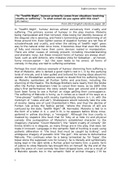English Literature - Revision
“In ‘Twelfth Night’, humour primarily comes from situations involving
cruelty or suffering”. To what extent do you agree with this view?
[25 marks]
From 2017 English Literature paper 1B
In ‘Twelfth Night’, humour derives almost exclusively from cruelty and
suffering. The primary scenes of humour in the play involve: Malvolio
being manipulated and then tortured, Viola losing her identity because of
the disguise she is wearing, and Feste’s tormenting and undermining of all
those around him. Even lighter scenes of slapstick humour are not free of
schadenfreude and cruelty, and when the setting of ‘twelfth night’ gives
way to the natural order once more, it becomes clear that even the lords
of folly and misrule have their comic devices rooted in manipulation.
There are other causes of comedy present, including misunderstanding
and dramatic irony, but these innocent forms of humour are always short-
lived, such as with Antonio, who mistakes Viola for Sebastian – an honest,
funny misconception – but this soon leads to his arrest; all forms of
comedy in the play are tied to suffering somehow.
Perhaps the most obvious example of humour stemming from suffering is
that of Malvolio, who is denied a good night’s rest in I, iii by the partying
lords of misrule, and is later gulled and tortured for having ideas above his
station. An Elizabethan audience would no doubt find his suffering funny,
as Malvolio symbolises all Puritan faiths and practices, including the
shunning of the theatre. The Burbage Brothers were nearly from the Globe
after the Puritan landowners tried to cancel their lease, so by 1600 (the
play’s first performance) the story would have got around and it would
have been funny to see a Puritan on stage getting their comeuppance.
The suffering of Malvolio is funny, as it comes as a result of his ways as a
“time-pleaser” battling with revelry (symbolically shown in I, iii, with the
metonym of “cakes and ale”). Shakespeare would naturally take the side
of revelry, being one of Lord Chamberlain’s Men, and thus the decline of
Puritan rule across the festive period, “where the choices of will are
confused by the date, Twelfth Night” (M. Kermode). Malvolio is lied to in
the form of a letter in II, v, and in III, iv he appears before Olivia cross-
gartered in yellow stockings, a “renegado”. Although the true cruelty is
masked by slapstick (the bush that Sir Toby et al hide in) and physical
comedy (the juxtaposition of Malvolio’s established character to the
imaginary character “Count Malvolio”), the “latent cruelty of comedy” (Dr
Emma Smith) is in disguise, as many things are in this play, that does not
make it innocent. Language in the semantic field of hunting is used, using
pathetic alliteration in “the trout that must be caught by tickling”, and
ambiguous imagery of parasitic bird “the gull”; this serves to dehumanise
Malvolio. This continues when he is being tormented by ‘Sir Topas’ (the
topaz stone the supposed cure for lunacy): he is literally and symbolically
being kept in the dark while a Puritan priest torments him, a poetic form
of justice to show Malvolio has brought this on himself. By the end of the
play this piece of cruel comedy has been stripped bare, and as a result of
it Malvolio speaks too in the semantic field of animal imagery (“I’ll be
1




